German transgender gender
Richard Law, UTC 2018-05-26 16:03 Updated on UTC 2018-06-11
I apologise for this post. It is dull, overlong and of only very specialised interest to other dullards. Because it is so dull I have added some attractive but largely irrelevant images of paintings.
English has its problems dealing with the wind of change in gender identity, but they are trivial in comparison with the struggles that are currently going on in German (and in French, too, but that's another story).
In English the majority of nouns are no longer gender-specific: Arthur Conan Doyle is an 'author' just as much as Dorothy L. Sayers is an 'author'. A car has a 'driver', whether that person is male or female.
Some words used to have male and female forms – 'actor' and 'actress', for example – but now by general convention the male form is applied to both equally. The turmoil around ' chairman ', 'chairwoman', 'chairperson' and just 'chair' has not yet settled, though.
Some words cause English speakers trouble – 'postman', 'stationmaster' etc. – but sooner or later someone comes up with a reformulation – the hearty but slightly derogatory Americanism 'mail carrier', for example.
German for the New Age
In contrast, German is currently in a linguistic nightmare from which its speakers are trying to awake, because every noun in German has a gender. For impersonal nouns this characteristic is merely irritating, but when the noun applies to a human then the trouble starts.
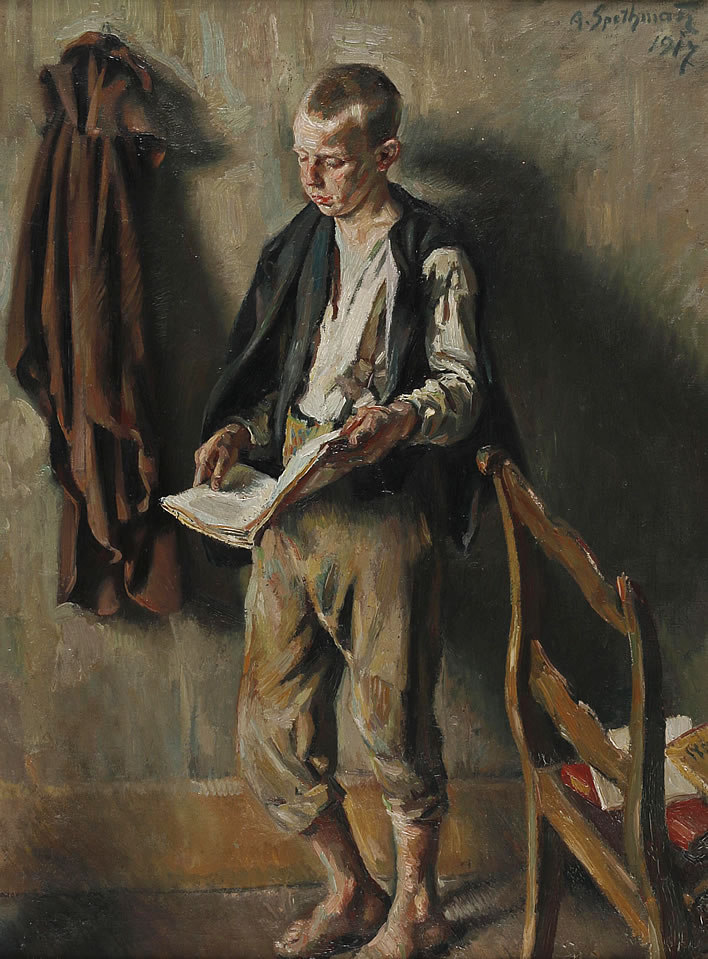
A strong, uncomplicated painting to get us started. The cheerful look of a boy before his German lesson: der Leser, der Schüler– (the reader, the [male] pupil). Image: Albert Spethmann (1894-1986) Vor der Schule / Before school, 1917. [Click on the image to open a larger version in a new browser tab]
Whereas in English you can write 'dear reader' and mean male or female reader alike, in German you have to choose between the male reader ' der Leser' and the female reader 'die Leserin'.

A female reader: Die Leserin. Image: Alexei Harlamoff (1840-1925) Girl Reading, ND. [Click on the image to open a larger version in a new browser tab]
Each of these has its own plural 'die Leser' (a number of male readers) and 'die Leserinnen' (a number of female readers). If the group is mixed the only recourse is to write 'die Leser und Leserinnen'. Limp-wristed, obsequious cavaliers ( toadies!) and feminist harridans write 'die Leserinnen und Leser', putting the female first.
Even worse: unlike in English, where you can just put an adjective next to a noun – 'dear reader' – and move on, in German, adjectives have to agree in gender, number and case with the nouns they qualify. You therefore have to write 'lieber Leser', 'dear male reader', or 'liebe Leserin', 'dear female reader' with no possibility of just mixing it together when you mean both. Your only option: 'Lieber Leser, liebe Leserin' or, for the cavaliers and harridans, 'Liebe Leserin, lieber Leser'.

Men at work. Moving into plurals, but all male: die Männer, die Arbeiter, die Knaben, die Zuschauer– (the men, the workers, the boys, the onlookers). Image: Axel Jungstedt (1859-1933) In the Quarry, motif from Switzerland, 1886. [Click on the image to open a larger version in a new browser tab]
In the good old, unreconstructed, pre-feminist, pre-transgender times, when men were men, women were women – and any who were not either the one or the other kept that fact to themselves ('consenting adults in private' and all that) – German authors could write the singular 'der Leser' and the plural 'die Leser' and get away with it. No one would get the idea into their heads that authors were referring only to male readers.
We should note here that although feminists like to imagine that the time before the 1970 was a a time of dreadful, oppressive cultural subjugation of women, this view is simply not true. Starting already in the middle of the 18th century in German speaking countries and then gathering strength from the beginning of the 19th century, women made up a large part – if not the majority – of the readership of newspapers and particularly magazines and books. Write for a female readership and your literary future was more or less assured in Germany by the end of the 19th century.

Reading as a female pastime of the 19th century: Die Leserin– (the [female] reader). Image: Charles Courtney Curran (1861-1942) Comfortable Corner, 1887. [Click on the image to open a larger version in a new browser tab]
Scrupulous writers might consistently use the full form 'die Leser und die Leserinnen', which, unless some specific gender distinction was under discussion, might be considered to be somewhat precious – the sort of flatulent language that Thomas Mann parodied in his novel Bekenntnisse des Hochstaplers Felix Krull (1954). Yet, as a result of the pressure of the Zeitgeist, this construction is now much more common.
We do not have to search long for an example, since Duden uses the construction in its definition of the word 'Leserschaft', 'readership':
Gesamtheit der Leser und Leserinnen von Büchern, Zeitungen, Zeitschriften und anderen Publikationen.
The generality of the [male] readers and [female] readers of books, newspapers, magazines and other publications
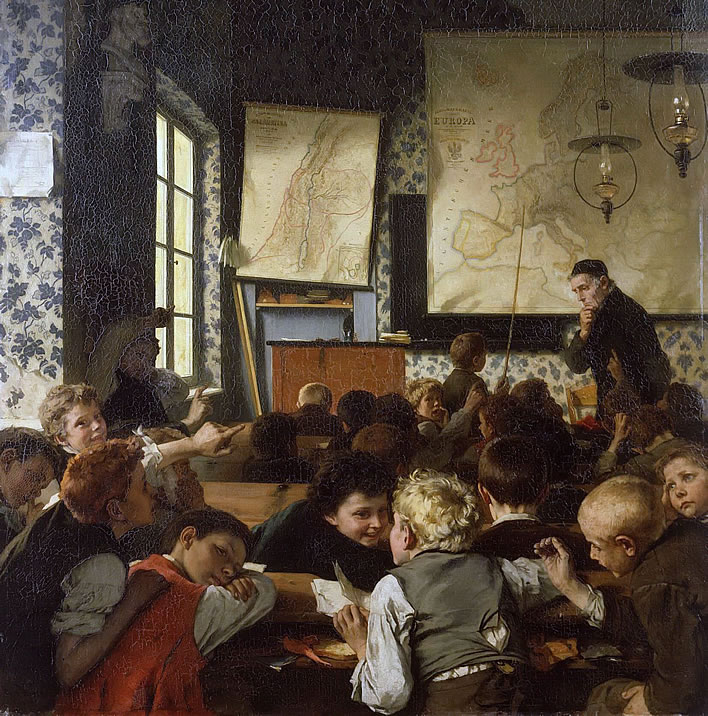
More maleness, but singular and plural: Der Lehrer, die Schüler, die Knaben– (the teacher, the [male] pupils, the boys). Image: Carl Hertel (1837-1895) Jung-Deutschland in der Schule / Young Germany in School, 1874. [Click on the image to open a larger version in a new browser tab]
Writing around it
Two examples of the many ways that writers of modern German attempt to cope with these essential gender characteristics in German fluttered across my computer screen in the last few days.
The first is an example of the technique that got so many Germans through their basic education: if you follow the rules of German grammar punctiliously you will always be in the right, even if the result is hideous. Here is a sentence from a Swiss website about allergies. It opens its piece, a warning about the current high concentrations of grass pollen in the air, with the following abomination:
Achtung, liebe Pollenallergikerinnen und -allergiker!
Watch out, dear females with pollen allergies and males with pollen allergies!
We note the usual cavalier/feminist female-first order, but the rest is difficult to grasp quickly, let alone speak aloud. The reason is that the author has been repelled by the clumsiness of the full form:
Achtung, liebe Pollenallergikerinnen und Pollenallergiker!
That is too much even for a writer of German. Cutting out the second occurrence of 'Pollen' shortens the sentence by five characters, but this slight brevity comes at a cost of the increased difficulty of parsing the sentence.
It would never occur to a writer with the slightest sense of style in German to come up, unforced, with a construction such as that. On the French and Italian versions of the website there is no hint of such teutonic nonsense.

More singular and plural masculinity during some male-bonding in the wine cellar: der Kellermeister or der Winzer or der Weinbauer, die Trinker, die Weinkenner– (the cellarman, the winemaker, the wine grower, the drinkers, the wine connoisseurs). Image: Johann Peter Hasenclever (1810-1853) Die Weinprobe (im Keller) / The Wine Tasting (in the Cellar), 1843. [Click on the image to open a larger version (black and white only, sorry) in a new browser tab]
The second example, from the Neue Zürcher Zeitung– a newspaper that holds itself to high standards in German – shows a more stylistically-aware writer avoiding the problem by using new words:
…eine Verringerung der Anzahl Lehrpersonen … zwei Lehrpersonen…
…a reduction in the number of teachingpersons … two teachingpersons…
The German noun 'die Person ' has become a trusty aid in these difficult gender times. Firstly, it is a feminine noun (hurray!) that can be applied equally to all types of person, male, female or anything else. Secondly, it has a very regular and simple declension, in which all cases singulars are 'Person' and all plurals are 'Personen'. Dammit – it's almost English in its simplicity!
In the same piece we find ' die Lehrkräfte' – another relatively harmless feminine plural used as an escape route from those tricky plurals 'die Lehrer und die Lehrerinnen'.
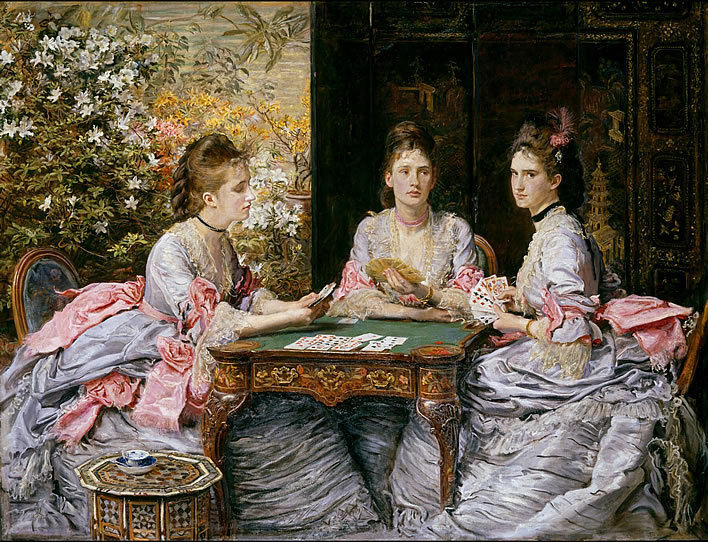
High time we got the wimmin involved: die Kartenspielerin, die Kartenspielerinnen– (the [female] card player, the [female] card players). Image: John Everett Millais (1829-1896) Hearts Are Trumps, 1872. [Click on the image to open a larger version in a new browser tab]
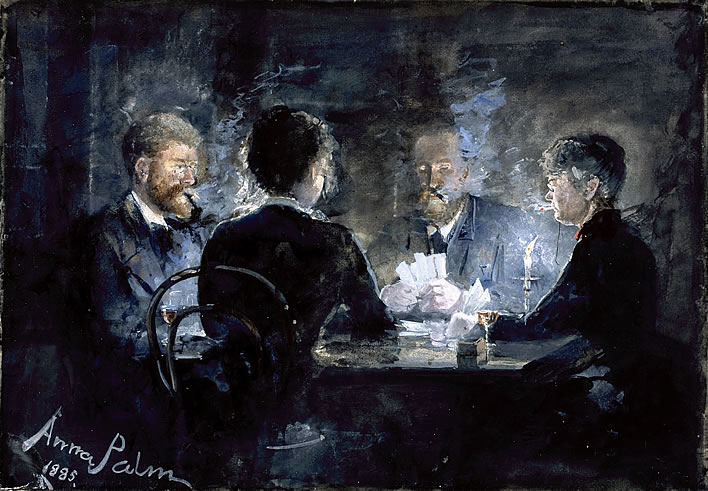
Now add some men into the card game: der Kartenspieler, die Kartenspieler, die Kartenspielerin, die Kartenspielerinnen, die Kartenspielerinnen und Kartenspieler– (the [male] card player, the [male] card players, the [female] card player, the [female] card players, the [female] card players and [male] card players). Image: Anna Palm de Rosa (1859-1924) Et l'hombre-parti på Brøndums Hotel / A Game of L'hombre in Brøndum's Hotel, 1885. [Click on the image to open a larger version in a new browser tab]
Any reader who followed the link we gave earlier to the Duden entry for 'Leserin' would have come across Duden's helpful 'special note' for avoiding the style problems:
Um gehäuftes Auftreten der Doppelform Leserinnen und Leser zu vermeiden, können je nach Kontext die Ausweichformen 'Leserschaft' oder '[Lese]publikum' gewählt werden.
In order to avoid a too frequent use of the double form [female teachers and male teachers], depending on the context the avoidance forms 'readership' or '[reading] public' can be used.
Before we uncork the bubbly, however, there are still two problems left over: no normal person speaks like this (yet) – 'who is your Lehrperson teacher, darling' – and, at the time of writing this at least, Duden doesn't even list 'Lehrperson ' as a word. The second of these problems is trivial, because, as you will note from the examples in the search results, Duden itself uses this word it doesn't officially recognise on a number of occasions in order to escape from a difficult circumlocution:
Bogen, auf dem die Lehrperson ihre Beobachtungen über die schulische Entwicklung eines Schülers, einer Schülerin einträgt
A sheet [of paper] on which the teachingperson enters her [die Person!] observations on the educational development of a male pupil, a female pupil.
'Lehrperson' substitutes elegantly and irresistably for 'der Lehrer' and 'die Lehrerin'. We now just need ' Lern person' to do duty for 'Schüler' and the job is done and dusted. They will catch up someday.
The interior 'I'
Avoiding all these problems worked fine until the second half of the 20th century, when for some incomprehensible reason women chose not to be formless wraiths any more.
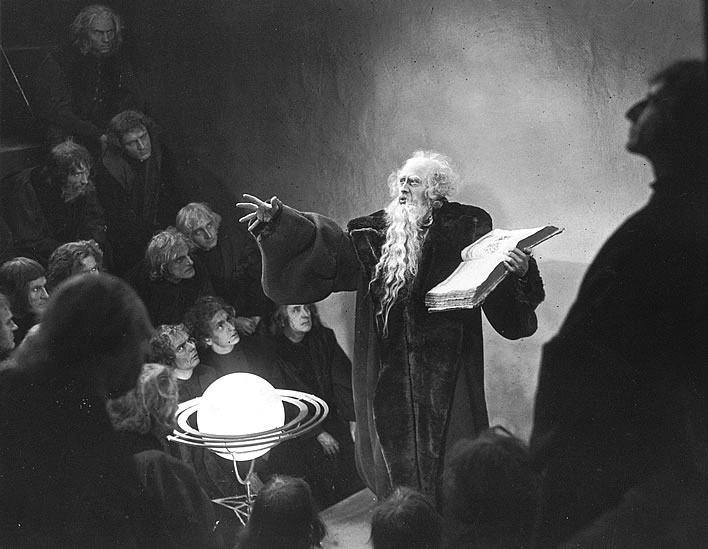
One last male domain, which women would be well advised to avoid at all costs, Dr Heinrich Faust's lectures: der Lehrer, der Professor, die Studenten (the teacher, the professor, the students)– Image: Still frame from Faust – Eine deutsche Volkssage, 1926. Faust played by Gösta Ekman. [Click on the image to open a larger version in a new browser tab]
This feeling arose among the blue-stockings of academia and spread to the submissive menfolk in their vicinity. A suitably academic solution was found: words such as 'LeserInnen', 'StudentInnen' etc. were born. The orthographic technique known to the computer programming community as the 'Pascal Case' naming of objects (e.g. ThisIsAnExample) was employed to create plural nouns that included both genders.
Soon the noticeboards of schools and all institutes of higher education were plastered with this nonsense. For obvious reasons the usage never really entered the common language: it 'smelled of the lamp'. No writer – male or female – wanted to give his or her readers the impression that they were only nineteen or wore sandals. Good writers continued to avoid the problem with tried and tested formulations, which also had the advantage that they bumped up the word-count when the creative going got tough. Nevertheless, the technique now has its own name in German linguistics, ' das Binnen-I', 'the interior I'.

A large number of women and one stressed-out fella: die Putzmacherin, die Putzmacherinnen, der Putzmacherder Arbeiter, die Arbeiterin, die Arbeiterinnen, der Arbeiter und die Arbeiterinnen; with the Binnen-I this becomes simply die ArbeiterInnen or die PutzmacherInnen– (the [female] hat maker, the [female] hat makers, the [male] hat maker, the [male] worker, the [female] worker, the [female] workers, the [male] worker and the [female] workers, the [male and female] workers). Image: Johann Hamza (1850-1927) Die Putzmacherinnen / The hat makers (The Feather Makers), 1902. [Click on the image to open a larger version in a new browser tab]
But the main reason for the lack of acceptance is clear: when spoken, 'LeserInnen' (a group of man and/or women) sounds just like 'Leserinnen' (a group of women). The modification of nouns using Pascal Case was only useful in the written language. In other words it was merely a half-hearted sop to female equality that was only useful for student noticeboards.
Speak as you write, write as you speak
This technique is even more of an oddity in the German language than it seems, because another fundamental and very rigorously observed feature of German is that in almost every instance apart from a few foreign words, Hochdeutsch, 'standard German' (i.e. excluding dialects) is written exactly as it is spoken – which is the reason it is sometimes called Schriftdeutsch, 'written German'.
This identity of written and spoken language is the foundation on which German is built and it is taken to lengths that English speakers find astonishing. For example, the word ' Mitteilung ', 'message/communication', (literally a 'with-sharing') will be pronounced in careful speech with two audible 't's:'Mit-teilung' (click on the small loudspeaker symbol in the Aussprache section of the Duden page linked here: two 't's, right?). This is because there is no such word in German as 'Mitt-eilung'.
In rapid dialect speech at a long table at the Munich Oktoberfest this difference may be scarcely audible (not that anyone there would ever need to say 'Mitteilung'), but in most educated speakers the two 't's are there for those who have ears to hear.
German newsreaders are proud of the ability of their dainty tongues to pronounce such things properly without sounding odd. The technique is, in effect, the 'long consonant' with a glottal stop, the analogue of the long vowel.
Blame the French, why not?
In contrast, the French influence on English (1066 and all that) has infected the English language with French habits of elision ('Mon' Blon'', the mountain and the penmaker) and irregular vowel deformations for which there are hardly any rules. A test of the native English speaker's mastery of German is whether the 'r's can be rolled in all their various ways. The converse is also true: can the German speaker surpress all these 'r's?
All this French muddle, plus the continued muddle from the organic development of English down the centuries, has left the modern speaker of English to cope with thousands of erratic spellings and/or pronunciations. George Bernard Shaw, a campaigner for the reform of spelling in English, famously pointed out that from a phonetic point of view the word 'fish' could just as legitimately be spelled 'ghoti' (enou[gh], w[o]men and essen[ti]al).
That staple of English education, the spelling test, is as good as unknown for German-speaking children, who pick up the speak-as-written rules of German in a flash. In compensation, German-speaking children have to endure regular dictations to alert them to the very few pitfalls of write-as-you-say, for example ' Regen ', 'rain', with the first 'e' long and the second short, which children may be tempted to write as 'Rehgen' because of the lengthening effect of the 'h'. Again, click on the loudspeaker at the link.
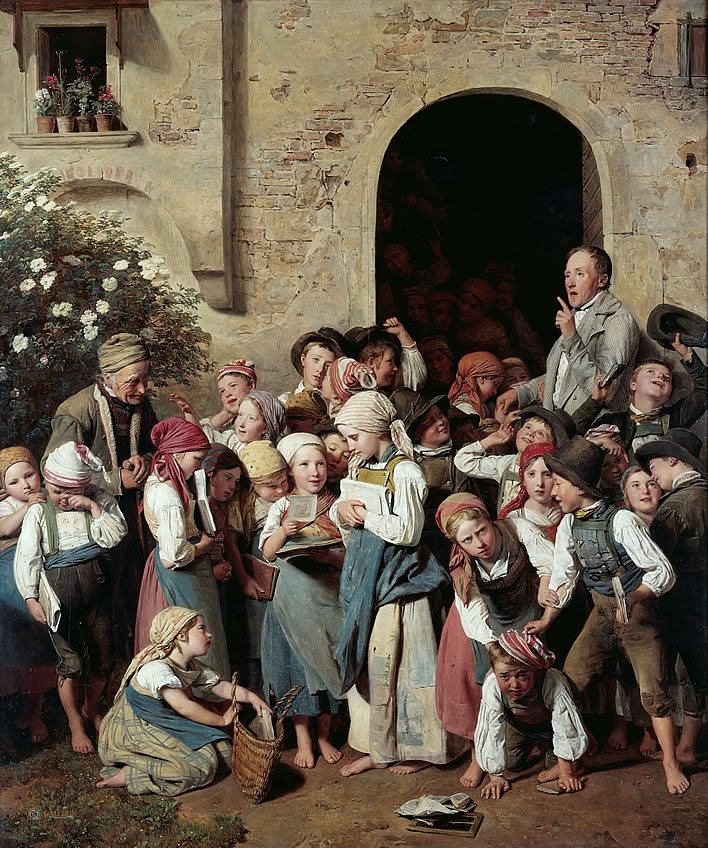
'Now it goes loose' [allegedly ™ the German President Heinrich Lübke (1894-1972)]: der Lehrer, der Grossvater, das Kind, die Kinder, das Mädchen, die Mädchen, die Schülerin, die Schülerinnen, der Knabe, die Knaben, der Schüler, die Schüler, die Schülerinnen und Schüler; in Binnen-I orthography we simply have die SchülerInnen– (the teacher, the grandfather, the child, the children, the girl, the girls, the [female] pupil, the [female] pupils, the boy, the boys, the [male] pupil, the [male] pupils, the [female] pupils and [male] pupils). Image: Ferdinand Georg Waldmüller (1793-1865) Nach der Schule / After School, 1841. [Click on the image to open a larger version in a new browser tab]
Apart from these few traps, the dictations are there not so much to teach children spelling but to encourage accuracy – no words left out, correct punctuation, word endings correct (very important in a language with four cases) and capitalisation (another German obsession) correct.
From this long-winded explanation you will realise that a written word that cannot be spoken aloud meaningfully and that violates the extensive rules on capitalisation is a serious formal problem for the German language.
From affectation to lunacy
The problem has not only not been resolved, it has just got much, much worse. As moderns (of both genders) have probably noticed, the concept of two genders only is now utterly passé and totally insufficient. We now we have to cope with a fluid continuum of gender, real, assumed or potential.
A gender warrior from the left-wing SPD in Germany – the Justice Minister, Katarina Barley, no less – is bringing the issue of gender fluidity into the German language. She has asked the editors of the Duden, the de facto source of language authority in German, to introduce the use of 'das Gender-Sternchen', the 'gender asterisk'. Whereas, as we have seen, the gender aware used to write 'LeserInnen' using Pascal case, now they have to write 'Leser*innen'.
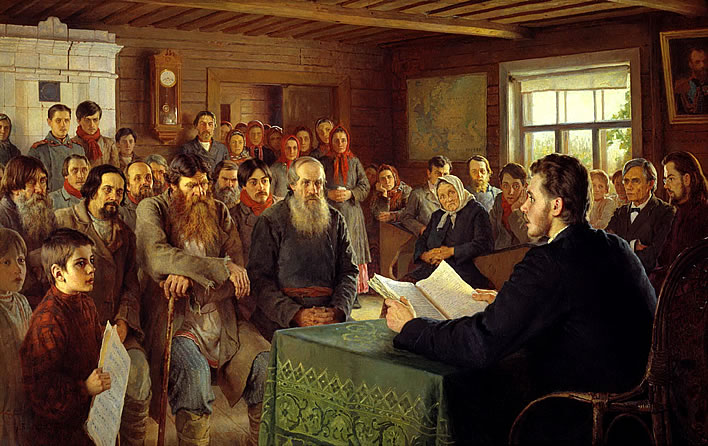
A grammatically challenging scene from Russia: der Vorleser, der Mann, die Männer, die Frau, die Frauen, der Knabe, die Knaben, der Zuhörer, die Zuhörer, die Zuhörerin, die Zuhörerinnen, die Zuhörerinnen und Zuhörer; there my be transsexual people in this crowd so we had better use the new Gender-Sternchen: die Zuhörer*innen– (the reader, the man, the men, the woman, the women, the boy, the boys, the [male] listener, the [male] listeners, the [female] listener, the [female] listeners, the [female] listeners and the [male] listeners). Image: Nikolai Bogdanov-Belsky (1868-1945) Sunday Reading in a Rural School, 1895. [Click on the image to open a larger version in a new browser tab]
We foreigners sigh at the complexities of this strange language, where you now have to choose between 'das Gender-Sternchen', 'das Gendersternchen', 'der Genderstern' etc., none of which are officially known to Duden anyway, which means you cannot look them up even if you wanted to. ' Der Asterisk ' is in the language, but little used as far as I know. It's a loan word, and as such upsets the purists who prefer 'das Sternchen', 'the little star'.
By some incomprehensible reasoning, the gender asterisk is considered to be the analogue of the placeholder used in computing to indicated 'any string at all'. A search for 'any*' will deliver 'anyone', 'anything', 'anywhere' and so on. This is not the place to go into all the usages of the asterisk (and its single-character relative, '?').
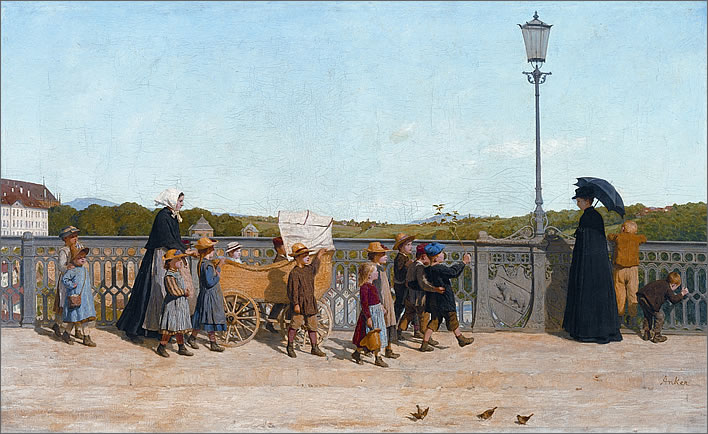
More language chaos in Bern, Switzerland: die Lehrerin, die Hilfslehrerin, die Lehrerinnen, das Kind, die Kinder, der Knabe, die Knaben, das Mädchen, die Mädchen, der Schüler, die Schüler, die Schülerin, die Schülerinnen, die Lehrerinnen, die Schülerinnen und Schüler; who knows what is under those black coats, so we had better call the adults die Lehrer*innen, similarly anyone of these children may be transitioning, so let's write die Schüler*innen– (the [female] teacher, the [female] assistant teacher, the [female] teachers, the child, the children, the boy, the boys, the girl, the girls, the [male] pupil, the [male] pupils, the [female] pupil, the [female] pupils, the [female] teachers, the [female] pupils and [male] pupils). Image: Albert Anker (1831-1910) Kleinkinderschule auf der Kirchenfeldbrücke / Infant School on the Kirchenfeld Bridge, 1900. [Click on the image to open a larger version in a new browser tab]
Misusing programming
I have no idea what can be substituted for the asterisk in Leser*innen – from a programming point of view 'Leser*' should have been sufficient. But since this would have caused the disappearance of the explicit feminine gender determinant, the purely programming solution would not have been acceptable to the feminists.
The confusion gets worse: some advocates for the gender-asterisk have been trying to legitimise it by talking of its use in the search language Regular Expressions (RegExp), but have merely thereby displayed their profound ignorance. In RegExp the asterisk is principally used not as a character equivalent (this task is performed for any character by the period, '.') but as a quantity determinant: e.g. 'Dora*' means match any number of 'a's including none at all – in effect, this expression would match 'Dora', 'Doris' and 'dor' etc. Searching for 'Dora+' on the other hand, means match any number of 'a's where there is at least one. That is, the expression would match 'Dora', 'Doraaaa' but not 'Dor'. All of which has absolutely no relevance to the new gender-fluid 'Leser*innen'. The construction is a logical abomination for which the Regular Expression language bears no responsibility whatever.
That of which we cannot speak
We talked about the problem with the unpronounceable nature of 'LeserInnen'; 'Leser*innen' takes this problem to a new level. Yet more silent virtue-signalling codes that are only visible in the written language. But in reality, the written language in its history, in the context of the biology of human development as well as in its very nature, arises from the spoken language.
Even digits, which have no inherent phonetic component, are speakable. The idea of introducing unspeakables into the written language is unspeakably bonkers.
The late musician Prince (1958-2016), when he renamed himself with a symbol, wisely took the trouble to supply a speakable interface: 'The Artist Formerly Known as Prince', thus demonstrating a profounder grasp of linguistic reality than the lefty mad(wo)*men who infest Berlin-Kreuzberg.
A very right-on solution might be to vocalise the '*' using the sort of click popular in African languages. German newsreaders have had it far too easy for far too long and would probably welcome the challenge of the new.
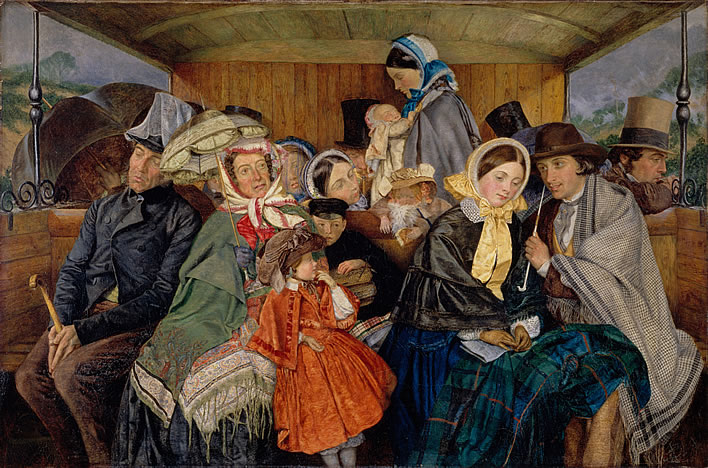
The grammar of the teeming humanity in the third-class carriage:der Mann, die Männer, die Frau, die Frauen, das Kind, die Kinder, der Knabe, das Mädchen, die Mädchen, der Reisender, die Reisende, die Reisenden, der Passagier, die Passagiere, die Passagierin, die Passagierinnen, die Passagiere und Passagierinnen; or, with gender sensitivity, since there are figures here who are clearly not what they seem to be on the surface, die Passagier*innen– (the man, the men, the woman, the women, the child, the children, the boy, the boys, the girl, the girls, the [male] traveller, the [female] traveller, the [male or female] travellers, the [male] passenger, the [male] passengers, the [female] passenger, the [female] passengers, the [male] passengers and [female] passengers). Image: Charles Rossiter (1827-1897). To Brighton and Back for Three Shillings and Sixpence, 1859. [Click on the image to open a larger version in a new browser tab]
Perhaps the fact that gender fluidity ultimately defeats all language and grammar is a hint to us: it is nonsense and we should allow no part of it to take hold on our precious languages.
Our two examples of avoidance techniques could all have been handled with the Binnen-I– PollenallergikerInnen, LehrerInnen – but it is telling that they were not. This inelegant fudge has found no acceptance in everyday German, the language of the common people.
There is therefore good reason to believe that its next step, the gender-asterisk, if accepted, will also become just a bit of virtue-signalling among the academic elite without wider acceptance.
Official German
Nevertheless, a government minister has now formally proposed it, bonkers or not, and her suggestions will go to Der Rat für deutsche Rechtschreibung, 'the Council for German Orthography', which lays down the officially approved way to write words – don't laugh – the next meeting of which is on 8 June.
If the Council finally says this is the way it should be, then Duden will be required to integrate the ruling into its many dictionary and language products. The decision will not be quick: position papers are already being circulated in advance of the meeting and the tribes of German Linguistics academics are already at each others' throats.
Among linguistics people the old codgers think the gender-asterisk is all rubbish, since fundamentally all gender in German is merely a language gender that depends to a large extent on the orthography of the noun – that why you can have 'das Mädchen', 'the girl' and refer to her as 'es', 'it'. In contrast, the youngsters think gender-bending diversity is going to be the future of language, so we should suck it up.
Albeit with a sinking heart, my bets are on the latter group to win out in the end, for they have the law on their side. Last year the Federal Constitutional Court said the the government must always offer the third way besides male and female, essentially 'neither of the above'. Neither rationality nor language has anything to say in such circumstances – written German will be bent to conform to the new political and cultural orthodoxy.
Our only hope is that they don't make the decision retrospective, in which case a thousand years of German literature will have to be revisited, just in case some gender-fluid person gets triggered reading Walther von der Vogelweide. Don't even mention the dynamic duo Max und Moritz. Children who read stories in which Prinzess*innen kiss Frösch*innen expecting beautiful young Prinz*innen to materialise on the spot may grow up doubting the wisdom of kissing frogs – and then where will we be?
I don't put any of this past the lunatics, either. The only consolation is that my small library will become a repository of illegal German books. Will they be pulped? Worse, will they be burned? If I want to keep them I'll have to live hidden away in the attic and pass the time writing letters to my imaginary best friend Kitty.
A simple solution
There is of course a much easier solution that is gradually being adopted by more and more Germans: speak English, a modern language with only very limited cases – albeit with erratic spelling and pronunciation.
The great advantage of English, though, is that the world-language is mangled in some way by almost every modern speaker. There is no Duden. There is no Council for English Orthography. Furthermore, no one is allowed under any circumstances to criticise anyone else's mangled English. You can make as many 'mistakes' as you like without fear of criticism.
Unless of course you are a five-year-old trying to cope with the hurt felt by your gender reassigned schoolfriend at being addressed as 'it'. In which case you had better get it right first time, or else your schooldays will be over and your parents in prison. Perhaps you, too, will need an imaginary pen friend.
Update 11.06.2018
The Rat für deutsche Rechtschreibung, the 'Council for German Orthography', began its deliberations on the vexed question of gender neutral German grammar in a meeting last Friday, 9 June. To no one's surprise, its 41 members decided to kick this can of worms down the 'wait and see' road. The next meeting of the council is in November and it would also be a surprise if it did anything other than give the can another substantial whack towards Sankt-Nimmerleins-Tag, 'St Never's Day'.
Despite our inclination to mock the existence and the work of such bodies, the Council on this occasion is doing the right thing. The days of authoritarian grammar prescriptions have long gone–modern linguistics is based on an empirical approach, even in German. This empirical approach allows the grammarians of the Anglosphere essentially just to let it rip: if 20 million people around the world begin speaking like some gangsta rapper, like, how can the language elite, like, complain at this, like, empirical fact?
In its decision not to decide, the Council took the same empirical approach: it could see no preference in current German usage for one form of gender neutral language over another. By the time of its meeting the Council had received in addition to the asterisk proposal a number of suggestions for flagging gender neutrality in German, all of them equally bonkers.
Although the decision is a sensible one, it is more than a little slippery, for it swerves completely the fundamental question: does the gender of German nouns depend on certain conventions, usually the ending of the word (e.g. das Mädchen 'the girl' = 'it' because of the -chen, die Entscheidung 'the decision' = 'she' because of the -ung), or does it depend on its relationship with real world gender?
If the choice is the former, then all the real world feminisations that are now in the language really have to be purged: a teacher is der Lehrer whether male or female. Die Lehrerin (and all the nonsense that derives from it that we described in this post) would get the boot. It wouldn't matter where on the gender spectrum the human teacher was, er would still be a Lehrer.
If the choice is the latter, that is, a choice for real world gender, the can would be upset and the worms would spill out and begin crawling all over the place. Over a thousand years of German language would have to be revisited. The only solution in this case would be to make all nouns for inanimate objects take the neutrum: der Frühling would become das Frühling, 'the spring' die Entscheidung, 'the decision' would become das Entscheidung– and of course all the prepostions and adjectives would have to be bent to fit the new genders.
Since we are talking about empirically-based grammar, try an empirical test: ask a native speaker of German to say das Frühling and das Entscheidung– you will see from the expression on their faces that this solution is completely unacceptable.
The [female] journalist reporting on the Council's decision for the Neue Zürcher Zeitung can only express her astonishment that in times of equality such steps are being taken to split apart linguistically the various groups in society. She also recalls the ultimately vain struggle of Swiss women in the 19th century to be addressed as Schweizer and not Schweizerin/innen. Women, the full equals of men, deserve the same nouns. Hear, hear!
0 Comments UTC Loaded:
Input rules for comments: No HTML, no images. Comments can be nested to a depth of eight. Surround a long quotation with curly braces: {blockquote}. Well-formed URLs will be rendered as links automatically. Do not click on links unless you are confident that they are safe. You have been warned!